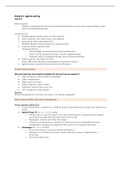Module 4: Agenda setting
Lecture 4
Walter Lippman:
- Lippmann stated ideas that were incorporated in later theories on news values, agenda setting, media
realism and stereotypes/frames.
Content lecture:
• Examples agenda setting: answer to which question
• Walter Lippmann 1922: News values, news agendas
• Classis article: McCombs & Shaw 1972:
à Media à public: Selective exposure or agenda setting
• Follow up: Walter Lippmann 1922:
- Stereotypes/frames:
o Entman (1988): narrative framing (Trump-wall-Mexicans)
o Tversky (1977): Associative framing / 2e level of agenda setting
o Druckman (2001): Equivalence framing / point of reference framing
• Follow-up article: Van Aelst et.al. 2014:
- Politics àß Media à public: whose agenda is influenced by whom?
• Agenda setting: example of (fake) news Ukraine referendum
Examples Agenda setting
Why were these the most important problems for the Durch (survey research)?
• 1994: immigrants, asylum seekers (asielzoekers)
• 1998: unemployment
• 2002: norms and values
• 2006: immigrants, asylum seekers
• 2010/2012: financial crisis, euro crisis
• 2017: immigrants, asylum seekers
Because:
Dit zijn onderwerpen die in die jaren het meest in het nieuws zijn geweest.
Walter Lippmann 1922: news values, news agendas
Walter Lippmann (1889-1974)
• Unseen environment is reported to us chiefly by words, transmitted by wire or radio, from reporters, to
editors.
• Nature of news à agenda setting in ComSci
o Publicity men, pr: saves the reports much time, presenting him a clear picture of a situation
out of which he might otherwise make nether head nor tail
o Newspapers influence each other most deeply
o The press is no substitute for institutions. It’s like the beam of a searchlight that moves
restingly about, bringing one episode and then another out of darkness into vision.
• Stereotypes à framing in ComSci
o We pick out what our culture has already defined for us.
o Attempt to see all things freshly and in detail, rather than as types and generalities, is
exhausting.
o The value of blind spots
, Citates of Lippmann
Lippmann on (the impossibility of) media realism
• “The world that we have to deal with politically is out of reach, out of sight, out of mind. It has to be
explored, reported and imagined.”
• “If we cannot fully understand the acts of other people, until we know what tget think they know, then
in order to do justice we have to appraise not only the information which has been at their disposal, but
the minds through which they have filtered it.”
à Om de wereld te begrijpen moeten we niet alleen weten hoe de wereld eruitziet, maar ook moeten begrijpen
hoe in iemand anders zijn hoofd de wereld eruitziet. Dit om te weten hoe anderen denken. Dit kan maar tot op
zekere hoogte.
Lippmann: “follow the news à know where to think about; not enough prior knowledge/news à accept the
frame/stereotype, know what to think
• In order that he shall enter he must find a familiar foothold in the story, and this is supplied to him by
the use of stereotypes.
• They tell him that if an association of plumbers is called a “combine” it is appropriate to develop his
hostility; if it is called a “group of leading businessmen” the cue is for a favorable reaction. (=use of
stereotypes, frames)
Mediatization and political agenda setting: (Van Aelst et al. 2014)
Agenda setting
Definition:
• Transfer of salience (not necessarily of opinions) from the media to their audience
= Het overdragen van wat belangrijk is van de media naar het publiek. Gaat niet zozeer of de mening
van het onderwerp, maar meer dat dit onderwerp belangrijk is.
Study design (p 178)
• Survey study (n=100)
o The answers of respondents regarding major problems/issues as they saw them
• Content analysis (5 newsp, 2 weekly’s, 2 tv stations)
o Issues in hard news and editorial comments appearing between September 2 and October 6 in
the sampled newspapers, magazines and news broadcasts.
• Hoofdvraag: The correlation between the major item emphasis on the main campaign issues carried by
the media and voters’ independent judgement of what were the important issues.




